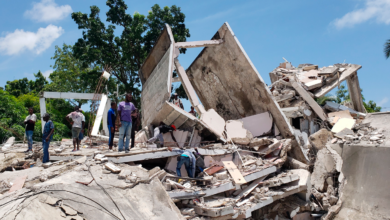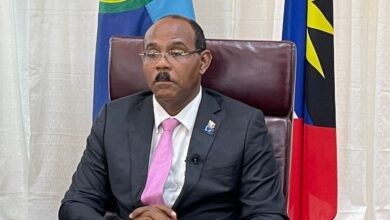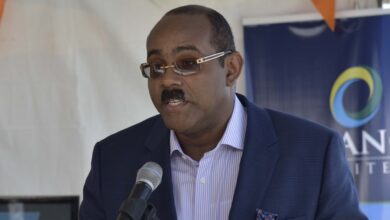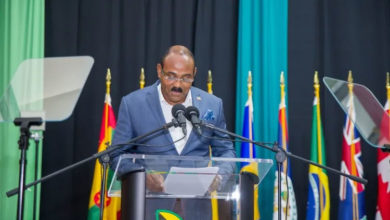- Colleague Heads of Government
- Incoming Chairman of Conference Prime Minister
- John Briceno of Belize
- Secretary-General of the Caribbean Community
- Carla Barnett
- Ministers and Senior Officials of Member States and of the Secretariat
- Members of the Media
- Ladies and Gentlemen:
I welcome you to this opening ceremony, which is a familiar one in the governance of the Conference of the Heads of Government of the Caribbean Community (CARICOM).
After six months as Chairman-in-Office of CARICOM, I hand the gavel of leadership to my colleague and friend, the Prime Minister of Belize John Briceno.
In doing so, I offer him my full support, as I am sure, all my colleagues do.
I do not offer my support lightly, or as a protocol gesture; because our unity and solidarity in CARICOM will be a vital and necessary element in the strength and stability of our Organization, as we face a world in flux.
All around us, very dangerous and volatile changes, threaten to overwhelm the international order, as we have come to know it.
As I speak, the guns of war are once again roaring in Europe in a military confrontation, that could bring two, nuclear-armed world powers into open conflict.
The implications of this development for world peace and security are almost too frightening to contemplate.
This trend towards danger and volatility across many spheres in international affairs, has characterized the past six months of my chairmanship, and I fully expect it to continue.
Six months ago, hardly had I assumed my responsibilities as Chairman of CARICOM, than we had the tragic news of the assassination of one of our colleagues, the President of Haiti, Jovenel Moise.
This was an event almost unheard of in our region, but a tragic reminder that our region is not immune from the forces of instability and criminality swirling around the world.
Barely had Haiti come to terms with the tragic loss of her president, than she was struck by an earthquake; followed shortly by the passage of Tropical Storm Grace.
In other parts of our Community, many of our member states struggled with the demands of the Covid-19 pandemic, that called for the vaccination of a significant portion of our populations in order to achieve herd immunity.
Obtaining adequate supplies of vaccines on the international market became an issue, and even with the help of CARPHA, PAHO and the establishment of the COVAX facility, several of our member states faced vaccine shortages.
Vaccine hesitancy also emerged as a significant regional challenge.
We remain grateful to those countries of the international community which stepped forward to fill the gap, such as India and the United States.
With resolute and joint action, I firmly believe that the worst of the Covid-19 pandemic is now behind us and our Community is emerging from the devasting effects of COVID on lives and livelihoods.
Climate change remains the most significant existential threat facing all of humanity.
The hopes of people in so many countries around the world, for meaningful action on the climate emergency, were dashed against the rocks of the obstinate and selfish attitudes of developed countries and large corporations assembled at COP26 in Glasgow, last November.
As chairman of the Alliance of Small Island States (AOSIS), I had the distinction of advocating on behalf of our small states; as we strive to make the world aware of the existential threat posed to our region by the world’s climate emergency.
It is not a secret that the results of COP26 fell far short of our expectations, and we continue our advocacy to push the major polluters of the world to reduce emissions, take mitigating actions and contain rising temperatures to within 1.5% of pre-industrial levels.
Greater attention will also be focused on climate emergency accountability, as we aggressively examine the legal recourses available to us under the appropriate international tribunal for the loss and damage, to end the injustices suffered as a result of the reckless actions of major polluters.
I believe that CARICOM has learnt from these developments to rely more and more on our own initiatives and our own resources. To produce, buy and consume local and regional products as a priority, for increased product security, profitability and sustainability.
We have taken decisions as a Community, to give priority to agriculture and tourism in our Covid-19 recovery strategy, given the impact of the Covid-19 pandemic on these sectors.
It is a truism that no community of nations, could be considered great if it cannot feed itself.
Food and Nutrition Security is an achievable goal and I look forward to the recommendations on the urgent implementation of the plan from the Ministerial Task Force, which is chaired by the distinguished President of Guyana.
The nutrition element is vital, as we battle against Non-Communicable Diseases which are rampant in our Region and continue to deplete our human resources, as a result of the effects of debilitating illnesses and pre-mature deaths.
As we produce and consume more regional products, we must commit to joint action, to develop reliable logistics and sustainable transportation to move goods and people within the region.
This necessitates increased commitment and joint action among member states, to facilitate a fully functional integration movement.
Colleagues:
The first CARICOM-Africa Summit was held September 7, 2021 and I want to commend my brother President Uhuru Kenyatta of Kenya, for the special efforts he made to make this Summit a reality.
The Summit acknowledged that the continent of Africa comprises five regions, but that the African Diaspora has been identified as the sixth region of Africa.
We welcome this designation and will do all in our power to develop and strengthen meaningful and beneficial relations between Africa and the countries of the Caribbean Community.
The first step in this direction has already been taken, with our decision to establish a diplomatic mission in Nairobi, Kenya.
This mission will serve as a platform, responsible for diplomatic outreach to other countries on the African continent, with which we hope to have deeper relations.
The summit also identified several areas for common action, including tackling the world climate emergency, and joint advocacy for the adoption of a Multi-dimensional Vulnerability Index, which will allow for the inclusion of more than just the narrow income-based criteria, currently in use to assess the eligibility of countries for concessionary financing.
This is not an issue we can allow to lapse, as so much of our development prospects, rest on persuading especially the international financial institutions that we are not being treated fairly.
I believe that the solidarity of our sister countries on the African continent can in fact be a game-changer on this issue, and rescue us from what has until now been a dialogue of the deaf.
Colleagues:
When I began, I offered the Prime Minister of Belize my full support as he discharges his responsibilities as Chairman, and in fact, I want to reiterate my pledge, because I know that we as a Community have some urgent tasks ahead of us.
Haiti is certainly among the priorities.
We need to work with Haiti in helping to resolve the deteriorating political situation in the country and the deepening public anxiety over citizen security.
Our Community has been engaged with Haiti at the highest political level, and has offered to assist in crafting a Haitian-led solution to the present crisis, that will garner the support of all the political forces in Haiti, as well as the international community.
Citizen security and political legitimacy, are what Haiti needs most at this time, and without these vital elements Haiti’s economic and social prospects will remain grim.
I am hoping that our Community can be the bridge to the UN and other major organizations of the international community, to bring these needed elements to Haiti, as well as, a strong measure of humanitarian assistance, rigorously applied.
Colleagues,
There are several items that did not make it onto this Conference agenda, as we seek to make the agenda more manageable and to prioritize and projectize the various programmes of activity, for effective implementation.
We must however continue to be vigilant in managing the threats of derisking, the proposed global minimum corporation tax and sanction-listing of so-called uncooperative jurisdictions by the OECD and European Union.
We must also enhance our negotiations of the EPA, to ensure that it delivers the promised benefits to allits members, including the LDC’s within Caricom.
The provision of affordable broadband is a public good, as vital as, the provision of water or electricity and should remain a regional priority.
Diversification and rapid economic expansion through digitalization require widespread enhancement of our Information and Communication Technology infrastructure.
Therefore, the cost of telecommunications and access to cheaper and more efficient broadband is quintessentialfor robust economic growth and development.
These and other realities should encourage us to move more urgently with the implementation of the CARICOM Single Market and Economy (CSME).
We can no longer afford the luxury of delaying approval of key instruments such as the Financial Services Agreement, Investment Policy, Incentive Regimes and the Development and Regulation of a Regional Securities Market.
The full operationalization of the CSME is required for the transformation of our economies and to fight for a robust post COVID recovery.
CARICOM needs to be able to shift gears and close its project implementation gaps, to ensure the full operationalization of the CSME.
One final note; a new Secretary-General took office during my term, and I want to commend SG Carla Barnett for what I’m seeing so far in the ongoing operations of the Secretariat, and I want to give every encouragement to the process of streamlining and rejuvenation that is underway.
I understand that changes are already afoot which would, for example, bring into being a more fit-for-purpose reorganization of the external trade and single market elements of the region’s work.
I commend the SG and the CARICOM Secretariat as they seeks to turn the mandates of the Heads of Government into meaningful and practical action and to address the many challenges that loom before us.
In closing, I wish us all a successful meeting, hoping as always that CARICOM moves from strength to strength, in the noble task of regional development and integration in which it is engaged.
I am obliged.






